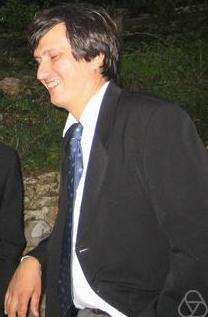Maxim Kontsevich
Maxim Lvovich Kontsevich (Russian: Макси́м Льво́вич Конце́вич, [mɐˈksʲim lʲˈvovʲit͡ɕ konˈt͡sɛvʲit͡ɕ] (![]()
Maxim Kontsevich | |
|---|---|
 | |
| Born | 25 August 1964 Khimki, Russian SFSR, Soviet Union |
| Nationality | Russian |
| Citizenship | Russia France |
| Alma mater | University of Bonn Moscow State University |
| Awards | EMS Prize (1992) Otto Hahn Medal (1992) Henri Poincaré Prize (1997) Fields Medal (1998) Crafoord Prize (2008) Shaw Prize (2012) Fundamental Physics Prize (2012) Breakthrough Prize in Mathematics (2014) National Academy of Sciences (Foreign Associate) (2015) |
| Scientific career | |
| Fields | Mathematics |
| Institutions | Institut des Hautes Études Scientifiques University of Miami |
| Doctoral advisor | Don Bernard Zagier |
| Notable students | Serguei Barannikov |
Biography
He was born into the family of Lev Rafailovich Kontsevich, Soviet orientalist and author of the Kontsevich system. After ranking second in the All-Union Mathematics Olympiads, he attended Moscow State University but left without a degree in 1985 to become a researcher at the Institute for Information Transmission Problems in Moscow.[4] While at the institute he published papers that caught the interest of the Max Planck Institute in Bonn and was invited for three months. Just before the end of his time there, he attended a five-day international meeting, the Arbeitstagung, where he sketched a proof of the Witten conjecture to the amazement of Michael Atiyah and other mathematicians and his invitation to the institute was subsequently extended to three years.[4] The next year he finished the proof and worked on various topics on mathematical physics and in 1992 received his Ph.D. at the University of Bonn under Don Bernard Zagier. His thesis outlines a proof of a conjecture by Edward Witten that two quantum gravitational models are equivalent.
His work concentrates on geometric aspects of mathematical physics, most notably on knot theory, quantization, and mirror symmetry. One of his results is a formal deformation quantization that holds for any Poisson manifold. He also introduced the Kontsevich integral, a topological invariant of knots (and links) defined by complicated integrals analogous to Feynman integrals, and generalizing the classical Gauss linking number. In topological field theory, he introduced the moduli space of stable maps, which may be considered a mathematically rigorous formulation of the Feynman integral for topological string theory.
Honors and awards
In 1998, he won the Fields Medal for his "contributions to four problems of Geometry". In July 2012, he was an inaugural awardee of the Fundamental Physics Prize, the creation of physicist and internet entrepreneur, Yuri Milner.[5] Also in 2012, he was awarded the Shaw Prize.[6] In 2014, he was awarded Breakthrough Prize in Mathematics.
See also
Notes
- "Maxim Kontsevich | Russian mathematician". Encyclopedia Britannica. Retrieved 2020-01-17.
- Kontsevich received French citizenship in 1999 and remains a dual citizen of both the France and his native Russia.
- Chang, Kenneth (23 June 2014). "The Multimillion-Dollar Minds of 5 Mathematical Masters". The New York Times.
- Sanders, Robert (October 12, 1994). "A Very Pleasurable Universe". www.berkeley.edu. Retrieved 2018-11-23.
- New annual US$3 million Fundamental Physics Prize recognizes transformative advances in the field Archived 2012-08-03 at the Wayback Machine, FPP, accessed 1 August 2012
- "The 2012 Prize in Mathematical Sciences: Maxim Kontsevich". Retrieved 29 June 2020.
References
- Fields Medal citation at the website of the 2002 International Congress of Mathematicians held in Beijing.
- Taubes, Clifford Henry (1998) "The work of Maxim Kontsevich". In Proceedings of the International Congress of Mathematicians, Vol. I (Berlin, 1998). Doc. Math., Extra Vol. I, 119–126.
External links
- O'Connor, John J.; Robertson, Edmund F., "Maxim Kontsevich", MacTutor History of Mathematics archive, University of St Andrews.
- Maxim Kontsevich at the Mathematics Genealogy Project
- AMS Profile of Maxim Kontsevich
- Official Homepage of Maxim Kontsevich
- Videos of Maxim Kontsevich in the AV-Portal of the German National Library of Science and Technology